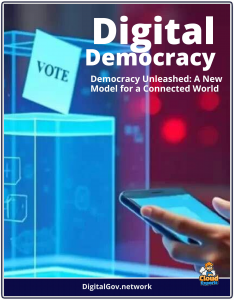 Modern politics often feels like a circus of soundbites, tribalism, and posturing, where the loudest voices or slickest campaigns drown out reason and substance.
Modern politics often feels like a circus of soundbites, tribalism, and posturing, where the loudest voices or slickest campaigns drown out reason and substance.
The spectacle can seem like a race to the bottom, appealing to base instincts rather than collective intelligence. But what if the problem isn’t just the players—it’s the game itself?
What if the systems we use to make decisions could be reimagined to restore trust, transparency, and true representation? Enter blockchain-based voting systems, a technological leap that could spark a societal transformation and breathe new life into democracy.
The Problem: A Crisis of Trust and Engagement
Today’s political landscape is marred by distrust. Polls consistently show that many citizens feel their votes don’t matter, their voices are ignored, or the system is rigged. Voter turnout in major democracies often hovers below 70%, and in some cases, much lower. Allegations of fraud, gerrymandering, and opaque processes further erode faith. Meanwhile, political discourse is increasingly polarized, with complex issues reduced to memes and slogans, leaving little room for nuanced debate or informed decision-making.
This low-IQ political environment thrives on inefficiency and mistrust. But it doesn’t have to be this way. Blockchain technology, best known for powering cryptocurrencies like Bitcoin, offers a path to revolutionize how we vote, engage, and govern—paving the way for a more intelligent, inclusive, and accountable democracy.
The Solution: Blockchain Voting as a Catalyst
At its core, blockchain is a decentralized, transparent, and immutable digital ledger. Every transaction—or in this case, vote—is recorded in a way that’s verifiable, secure, and resistant to tampering. By applying this technology to voting, we can address the systemic flaws that fuel distrust and disengagement. Here’s how blockchain-based voting systems could transform democracy:
Unbreakable Trust through Transparency
Blockchain’s public ledger ensures every vote is recorded transparently and can be audited by anyone, anywhere. Unlike traditional systems, where ballots can be lost, miscounted, or manipulated, blockchain creates a permanent, verifiable record. Voters can confirm their vote was counted correctly without compromising anonymity, restoring confidence in the process.
Accessibility and Inclusion
Imagine casting your vote from your smartphone, securely and instantly, from anywhere in the world. Blockchain-based systems can make voting as easy as sending an email, removing barriers like long lines, limited polling hours, or geographic constraints. This could dramatically increase participation, especially among young people and marginalized communities, giving democracy a broader, more diverse voice.
Security That Stands Up to Scrutiny
Cybersecurity threats loom large over current voting systems, from hacked machines to foreign interference. Blockchain’s cryptographic foundation makes it virtually impervious to tampering. Each vote is encrypted, and the decentralized nature of the system means there’s no single point of failure for hackers to exploit. This security could eliminate doubts about election integrity.
Empowering Direct Democracy
Blockchain enables more than just secure elections—it opens the door to continuous, real-time participation. Citizens could weigh in on specific policies or local issues through secure digital referenda, reducing reliance on representatives who may prioritize party lines over public will. This could foster a culture of informed debate, where ideas, not soundbites, drive decisions.
By enabling direct participation through secure, decentralized platforms, these models ensure that governance reflects the collective will, not just the loudest voices.
A Societal Transformation
The adoption of blockchain-based voting isn’t just a technical upgrade; it’s a catalyst for a broader societal shift. By restoring trust and accessibility, it could rekindle civic engagement, encouraging people to see themselves as active architects of their society rather than passive spectators.
This transformation could unfold in several ways:
- Elevating Discourse: When voting is secure and accessible, the focus shifts from manipulating outcomes to persuading voters with ideas. Politicians would need to appeal to reason, not just emotion, fostering a more substantive public conversation. Blockchain’s transparency could also deter misinformation, as voters could verify claims against trusted, immutable records.
- Empowering Communities: Localized blockchain voting could give communities greater control over issues like budgets or infrastructure. This hyper-local democracy would encourage citizens to educate themselves on policy details, raising the collective IQ of political engagement.
- Global Inspiration: A successful blockchain voting model in one nation could inspire others, creating a domino effect. Countries struggling with authoritarianism or electoral corruption could adopt these systems, amplifying democratic ideals worldwide.
Decentralized governance models, enabled by blockchain technology, take this vision further by fundamentally reimagining how power is distributed and decisions are made. These models move away from centralized hierarchies, where a few wield disproportionate influence, toward systems that empower individuals and communities to govern themselves transparently and collaboratively.
Challenges and the Path Forward
No transformation comes without hurdles. Blockchain voting requires robust infrastructure, widespread digital literacy, and safeguards to protect voter privacy.
Critics might argue about the risks of digital divides or the complexity of implementation. These are valid concerns, but they’re not insurmountable. Pilot programs, like those tested in places such as West Virginia (2018) and Utah (2020), have shown blockchain voting’s potential. Scaling these experiments will require investment, public education, and collaboration between governments, tech innovators, and citizens.
Moreover, blockchain’s success depends on a cultural shift. Technology alone won’t fix apathy or polarization—citizens must embrace their role in a more active, informed democracy. Education campaigns, open forums, and incentives for participation can bridge this gap, turning blockchain’s potential into reality.
A Call to Action: Blockchain for a New Era of Democracy
The low-IQ politics of today thrives in a system that rewards division and distrust. Blockchain-based voting offers a way out—a chance to rebuild democracy from the ground up. It’s not just about casting votes; it’s about creating a society where every voice is heard, every vote counts, and every citizen feels empowered. This is the revolution democracy needs: one where technology amplifies our collective intelligence, restores faith in governance, and inspires us to dream bigger for our shared future.
Let’s seize this moment. Let’s demand systems that reflect our highest aspirations, not our lowest impulses. The tools are here—now it’s up to us to use them to transform democracy for the better.




